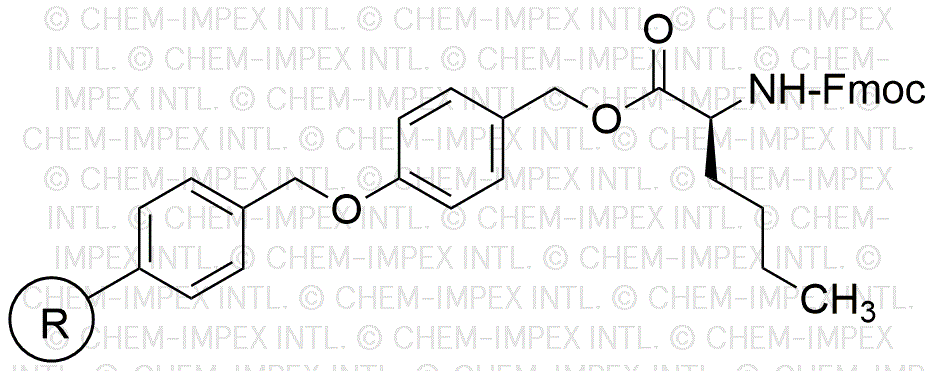Fmoc-L-norleucine 4-alkoxybenzyl alcohol resin is widely utilized in research focused on:
- Peptide Synthesis: This resin is essential for solid-phase peptide synthesis, allowing researchers to create complex peptides efficiently and with high purity.
- Drug Development: It plays a critical role in the pharmaceutical industry for developing peptide-based drugs, providing a reliable method for producing therapeutic compounds.
- Bioconjugation: The resin can be used to attach peptides to other biomolecules, facilitating the creation of targeted drug delivery systems and improving therapeutic efficacy.
- Research in Protein Engineering: Scientists utilize this resin to modify peptides and study their interactions, aiding in the design of novel proteins with enhanced functions.
- Custom Peptide Libraries: It enables the generation of diverse peptide libraries for screening potential drug candidates, significantly speeding up the discovery process.
Información general
Propiedades
Seguridad y normativas
Aplicaciones
Fmoc-L-norleucine 4-alkoxybenzyl alcohol resin is widely utilized in research focused on:
- Peptide Synthesis: This resin is essential for solid-phase peptide synthesis, allowing researchers to create complex peptides efficiently and with high purity.
- Drug Development: It plays a critical role in the pharmaceutical industry for developing peptide-based drugs, providing a reliable method for producing therapeutic compounds.
- Bioconjugation: The resin can be used to attach peptides to other biomolecules, facilitating the creation of targeted drug delivery systems and improving therapeutic efficacy.
- Research in Protein Engineering: Scientists utilize this resin to modify peptides and study their interactions, aiding in the design of novel proteins with enhanced functions.
- Custom Peptide Libraries: It enables the generation of diverse peptide libraries for screening potential drug candidates, significantly speeding up the discovery process.
Documentos
Hojas de datos de seguridad (HDS)
La SDS proporciona información de seguridad completa sobre la manipulación, el almacenamiento y la eliminación del producto.
Especificación del producto (PS)
La PS proporciona un desglose completo de las propiedades del producto, incluida la composición química, el estado físico, la pureza y los requisitos de almacenamiento. También detalla los rangos de calidad aceptables y las aplicaciones previstas del producto.
Certificados de análisis (COA)
Busque certificados de análisis (COA) ingresando el número de lote del producto. Los números de lote y de partida se pueden encontrar en la etiqueta de un producto después de las palabras "Lote" o "Lote".
Número de catálogo
Número de lote/lote
Certificados de origen (COO)
Este certificado de origen confirma el país en el que se fabricó el producto y también detalla los materiales y componentes utilizados en él y si se deriva de fuentes naturales, sintéticas u otras fuentes específicas. Este certificado puede ser necesario para cumplir con las normativas aduaneras, comerciales y regulatorias.
Número de catálogo
Número de lote/lote
Hojas de datos de seguridad (HDS)
La SDS proporciona información de seguridad completa sobre la manipulación, el almacenamiento y la eliminación del producto.
DownloadEspecificación del producto (PS)
La PS proporciona un desglose completo de las propiedades del producto, incluida la composición química, el estado físico, la pureza y los requisitos de almacenamiento. También detalla los rangos de calidad aceptables y las aplicaciones previstas del producto.
DownloadCertificados de análisis (COA)
Busque certificados de análisis (COA) ingresando el número de lote del producto. Los números de lote y de partida se pueden encontrar en la etiqueta de un producto después de las palabras "Lote" o "Lote".
Número de catálogo
Número de lote/lote
Certificados de origen (COO)
Este certificado de origen confirma el país en el que se fabricó el producto y también detalla los materiales y componentes utilizados en él y si se deriva de fuentes naturales, sintéticas u otras fuentes específicas. Este certificado puede ser necesario para cumplir con las normativas aduaneras, comerciales y regulatorias.

